Contract / Outsourced Research Organisations (CRO’s)
Specialist support in Pain and Health Related Quality of Life (HRQL) measurement in Dogs and Cats for Contract Research Organisations.
CRO interested in:
- Natural animal models of disease.
- Combining HRQL measurement with your biomarker testing.
- Providing your clients with evidence of HRQL improvement to help with their marketing and launch.
- Specialist guidance on optimising trial design for the measurement and interpretation of pain and HRQL scores.
- A single HRQL assessment tool for all conditions and illnesses.
- Adding HRQL and pain assessment to your Toxicology services.
- Measure and improve the welfare of Dogs and Cats being used in biomedical research.
How can NewMetrica help your CRO?
- World leader of Pain and Health-Related Quality of Life assessment in Dogs and Cats.
- Trusted by some of the world’s largest Animal Medicines companies.
- FDA 21CFR compliant. CVM confirmed scoring algorithms in 2019.
- The only validated instrument to measure HRQL in sick dogs across all conditions.
- Measures the impact of chronic pain.
- Highly responsive to clinical change.
- Lowest placebo response available.
- Electronic Data Capture, reporting and API data links.
- Allows comparison of results with a healthy population.

"I have been using VetMetrica for over 18 months now and have found it has revolutionised how I monitor patients and collect data. It is very easy to set up and the tools are intuitive and easy to follow
VetMetrica provides a great window into the animals’ quality of life and how it feels in its home environment. This has enabled me to better care for these patients and also collect good quality data for future publications. I cannot recommend VetMetrica enough. "
Andy Armitage, Greenside Vet Practice

Vetmetrica offers a valuable tool in assessing the impact of chronic pain on quality of life in dogs & cats. When treating chronic pain, most owners say that quality of life is paramount and they want their pet to be pain free. Vetmetrica engages owners and gives them the ability to measure quality of life.

"I found that a computer based scale run by Newmetrica... the same great people who gave us the Glasgow Pain Scales... is a wonderful way to get reliable quality of life scores. You can find it here at http://www.newmetrica.com/vetmetrica-hrql/. It generates a non-biased decision using a computer algorithum. Answers are weighted differently so it is harder for the caregiver to subconsciously manipulate the outcome. And they cannot go back and change their answers like they can on paper form" Dr Mike Petty

“Firstly I want to congratulate you and your team on the important work you are doing in the field of pain assessment and in particular the NewMetrica HRQL tool which I think is a real game changer!” – Leon Warne.



